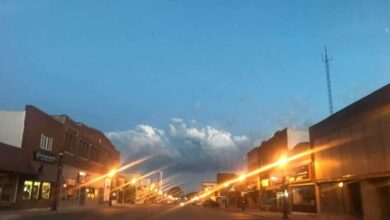Native Americans gather in North Carolina to celebrate Catholic faith, traditional culture | Dose of Faith

An attendee at the 85th annual Tekakwitha Conference in Raleigh, N.C., crafts a sweetgrass bookmark July 5, 2024, at a session led by Vicky Philips, Debbie Francis and Erin Francis. (OSV News photo/courtesy NC Catholics)
RALEIGH, N.C. | The Tekakwitha Conference “is the world’s largest gathering of Catholic, Native Americans,” said Jody Roy of Chicago, who was in Raleigh to attend the 85th annual conference.
“We represent more than 500 different tribes in the United States. Here, we share how we integrate our traditional culture with Catholic faith,” she told NC Catholics, the magazine of the Diocese of Raleigh.
Roy, who attended her first Tekakwitha Conference in 2005, was among people from states such as South Dakota, New Mexico, Colorado, New York and Louisiana who gathered July 3–7 at the Raleigh Marriott City Center for the 2024 conference. Attendees also traveled from Quebec, Canada, organizers said, and programming was offered for both youth and adults.
Roy is Ojibwe, which, she said, is one of the Great Lakes tribes. As she constructed a bookmark of fresh sweetgrass and black ash during an afternoon conference session, she noted that her favorite part of the five-day conference was praying as a group.
The conference offered attendees sunrise services, a trip to Fourth of July fireworks at nearby Dix Park and sacraments such as reconciliation.
It also presented an opportunity to focus on the life of St. Kateri Tekakwitha, known as Lily of the Mohawks. She was born in 1656 in an area known today as Auriesville, New York. During her short life, she lost her parents and brother to smallpox, converted to Catholicism and died in her 20s of illness. The first North American, Indigenous saint in the church, she was canonized in 2012.
Among the speakers was Deacon Larry Deschaine of the Diocese of Charleston, South Carolina, a descendant of multiple tribes, who discussed the Truth & Reconciliation Meditation Garden at Mepkin Abbey, the Trappist monastery in Moncks Corner, South Carolina. The garden is described as “an opportunity for visitors of different views and backgrounds to reflect on our shared past, shared pain and shared desire for reconciliation.”
Julienne Montour, a Mohawk from Michigan, spoke about boarding school healing. Between 1819 and 1969, there were more than 523 government-funded, and often church-run, boarding schools across the U.S. that separated Native children from their families, depriving them of their languages, cultures and identities to forcibly assimilate them into the dominant white culture.
Workshops included Native inculturation of the Roman liturgy, which was led by Father Michael Carson, assistant director for Native American Affairs at the U.S. Conference of Catholic Bishops. Other workshops focused on grief, parenting, caregiving, human trafficking and vocations.
Four bishops and 12 priests and deacons joined attendees in the celebration of Mass July 5. Bishop Chad W. Zielinski of New Ulm, Minnesota, chairman of the USCCB’s Subcommittee on Native American Affairs, was present, as were Bishop Jaime Soto of Sacramento, California, Bishop Ramon Bejarano of San Diego and Bishop Luis R. Zarama of of Raleigh.
Bishop Zarama began his homily by commenting on the 106-degree heat, a record high for July 5 in the city.
He discussed following Jesus with gratitude and also spoke of the life of St. Kateri.
“You have been motivated to come here because of her … and her internal struggle … to find peace and love,” he said. “Sometimes we see the saint and take for granted why they became a saint. We don’t see the moment the Lord called her. How often are we in the same position?”
Bishop Zarama encouraged those gathered to share their time with Jesus, believe in the transformative power of love and to be examples of living faith.
Prayers of the faithful included intentions for those who feel isolated or bullied because of their heritage as well as prayers for harmony and the canonization of the Florida martyrs.
During Mass, three beats of a hand drum marked the moment just before consecration. In addition to the drum, musicians playing a keyboard and a Native American flute made of rosewood added to the celebration.
Youths Pheji Hota-Wiya and Bree Black Bear wanted to give something special to the visiting bishops and made replicas of hair pipe necklaces with a St. Kateri medal on them. The necklaces, they said, were similar to what would be made by the Lakota people of South Dakota.
In an interview with NC Catholics ahead of the Tekakwitha Conference, Father David Miller, chaplain to the Native American Catholic community in the Raleigh Diocese, said the annual gathering is an important event for faith, culture and awareness and is for all “friends,” Native American and non-Native American.
It’s ecumenical in nature, like a Kateri Circle, is welcoming and seeks to bring cultures together for understanding, the priest added.
According to the Tekakwitha Conference organization, based in Alexandria, Louisiana, a Kateri Circle is a group of faithful Catholics, non-Catholic Christians “and/or seekers who desire to be in community with one another through a lifestyle of prayer, service and worship.”
Father Miller, who is pastor of St. Mildred Parish in Swansboro, North Carolina, was ordained in Raleigh in 2019. Originally from Oklahoma, he’s a citizen of the Cherokee Nation.
He has served in his chaplain’s role for almost a year, and his time has been marked by establishing a strategic plan for engagement and evangelization. He noted that In the Diocese of Raleigh’s northern areas, there are many tribes, and he has engaged both pastors of Catholic parishes and tribal leadership.
“It’s very cultural with Native Americans. … They identify themselves as (citizens or members of) a particular tribe,” he explained. “You have to get in and engage the people where they are. … All of this falls back to what the pope has been telling us. When I say evangelize, it means more than going out to baptize or confirm, that’s for the pastors. What I am trying to do is raise awareness of the Native American people.”
During their spring general assembly in June, the U.S. bishops approved a new pastoral plan for Indigenous Catholics, “Keeping Christ’s Sacred Promise: A Pastoral Framework for Indigenous Ministry.” The 56-page text was developed by the USCCB’s Committee on Cultural Diversity in the Church and its Subcommittee on Native American Affairs.
Along with acknowledging and apologizing for the church’s role in decimating Indigenous cultures in the U.S. — particularly through the boarding school system — the five-part plan focuses on calls for healing, mission, reconciliation, holiness and transformation in ministry to the nation’s Indigenous Catholics, whose “journey … in the United States of America has been marked by moments of great joy but also of profound sorrow,” the document states. “Through this pastoral framework, we … hope to begin anew a journey of mutual accompaniment with the Catholic Indigenous Peoples of these lands,” states the document.




